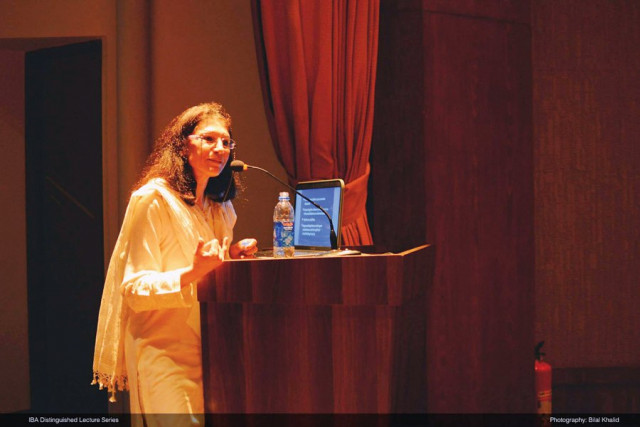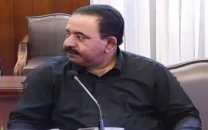‘Pakistan not incapable of evolving viable democracy’
Ayesha Jalal believes Jinnah’s early death robbed Pakistan of his steadying hand

Historian Ayesha Jalal. PHOTO COURTESY: IBA SOCIAL SCIENCES CLUB
Ayesha Jalal, who serves as the Mary Richardson Professor of History at Tufts University and has an over 30 years of writing and research experience on Jinnah, said this while reading a research paper on ‘How relevant is Jinnah’s vision in today’s Pakistan’ at Sindh Madressatul Islam University (SMIU) on Saturday.
Musharraf says democracy in Pakistan is ineffective
She was of the view that Mohammad Ali Jinnah’s early death in September, 1948, robbed Pakistan of the much-needed steadying hand of the founder of the nation at the helm of perilous times.
According to her, Jinnah, who looked every bit like a gentleman, held a pivotal place in the future of India. He made history despite overwhelming odds, she said. She quoted British journalist Beverly Nickels who described the stylishly dressed barrister as ‘the most important man in Asia’.
There are no more glaring contradictions between the founder’s vision and Pakistan today such as constitutional stalemates between the judiciary and parliament, the civil-military tussle and fragmentation and loss of ethos among the administrative services, she maintained.
“It’s not that Pakistan is not capable of evolving a viable democratic system and [is] destined to remain a centralised authoritarian state under military rule,” she read from her paper. “Pakistan’s struggle for democracy has suffered from sustained political dysfunction caused by staggering nonchalance shown by successive governments.”
According to her, despite progress in devolving power to the constituent units under the 18th amendment, it is by no means obvious that Pakistan has strengthened or is even in the process of strengthening federalism since no strong federations are made from the decentralisation of power.
Democracy there and here?
She further read that the die-hard constitutionalist that the Quaid-i-Azam was, he wanted to get rid of provincialism and thought it as a great curse as India’s Muslims considered themselves to be Sindhi, Punjabi, Pathan or Delhi Muslims first. “If we want to make Pakistan truly prosperous we should wholly and solely concentrate on the wellbeing of people and especially of the masses and the poor,” she said, quoting Jinnah.
The vice-chancellor of SMIU, Dr Muhammad Ali Shaikh, also addressed the event. “A person starting with so many disadvantages belonging to working class community and rising up to a level that he emerges as the sole spokesperson for [all] the Muslims in the Indian subcontinent is an example [of] how one can rise [through a struggle],” he said to the students of the alma mater of the nation’s founder. He emphasised that no matter how big the challenges are that we face, we must not restrict ourselves in the achievement of our goals.
Published in The Express Tribune, January 23rd, 2017.



















COMMENTS
Comments are moderated and generally will be posted if they are on-topic and not abusive.
For more information, please see our Comments FAQ